Land of Blood and Money
By Mazhar Abbas | Newsbeat | Published 12 years ago
When veteran politician Mahmood Khan Achakzai, leader of the Pakhtunkhwa Milli Awami Party (PkMAP), referred to Karachi as a “city of terrorists,” his choice of words may have upset many. But if one runs through the Supreme Court of Pakistan’s order on the security situation in Pakistan’s economic hub, one would realise that he is not off the mark.
This statement was subsequently confirmed by journalists, businessmen and members of civil society in their meetings with Prime Minister Nawaz Sharif, when he came to Karachi with members of his cabinet for three days last month to thrash out a solution while the city reeled from the growing incidence of extortions, kidnappings for ransom and target killings — 10 or more in a day.
At the end of his trip, the Prime Minister ordered the Rangers to carry out a multi-pronged operation in Karachi, with the backing of the Sindh government. The only party that appeared to be unhappy and critical of the move was the MQM, which had demanded that the army be asked to conduct the operation.
In fact, they showed their anger when MQM leader Nadeem Hashmi was arrested in connection with the murder of two policemen. As is the MQM practice, it brought the whole city to a halt by announcing a shutter-down strike. Hashmi was later released after a Joint Interrogation Team (JIT) found no evidence against him. But the MQM came under serious criticism from all parties and civil society for overreacting instead of taking legal recourse.
That could be one of the reasons why the MQM did not protest as strongly when an FIR was lodged against MQM MNA and ex-PPP leader, Nabil Gabol, in the high profile murder of Zafar Baloch, a leading member of the Peoples Aman Committee.However, investigators have hinted that Gabol’s name may be withdrawn as the inquiries have revealed that Baloch’s murder could be the result of infighting between the Uzair Baloch and the Baba Ladla groups. The recent arrests and killings of people linked to the Lyari gang war are often found to be connected to this internecine war.
The MQM aside, there has not been any major hue and cry against Prime Minister Nawaz Sharif’s decision to launch yet another operation in Karachi against criminals and terrorists — his third so far.
The last two operations were conducted during his last two tenures, in 1992 and in 1998, and they were specifically targeted at the MQM. Incidentally, the PPP government had also launched an operation in 1994-1996, that resulted in a massive increase in extra-judicial killings. However, on all three occasions, the MQM managed to get the backing of the then opposition parties, something which has been missing so far.
This time around, both mainstream political parties, the PPP and the PML-N, are on the same page on tackling Karachi’s law and order situation. Secondly, the center is not interested — at least so far — in dislodging or conspiring against the PPP-led government in Sindh. Thirdly, unlike in the past, there is no visible evidence of the intelligence agencies having a political agenda like they did in the 1992 operation. And lastly, both the PML-N and the PPP want an operation above party lines, and finally the MQM has had to come round to supporting the operation.
In a city which has doled out billions in bhatta every month to outlawed militant groups, alleged militant wings of political parties and the police, the job is more difficult than it initially appeared to be. Many militants escaped due to early tips allegedly provided to them by “insiders.” In fact some of them were arrested in places like Murree and Lahore.
Traders, who are among the main victims of kidnapping for ransom and the parchi system, though satisfied with the operation so far, fear that the criminals may simply bounce back if there is any relaxation in the operation. In fact, recently some of the criminals involved in bhatta and kidnapping cases, who were arrested in the recent operation, have sent ‘slips’ to traders, with increased extortion rates. One of the extortionists stated in his message that, since they now have to pay the lawyers as well, they require extra money.
But this is just the first phase of the operation, and there has been a considerable decline in incidents of target killing, particularly the Taliban and sectarian-related killings. But this could also be a tactical move on the part of the militants, as even Interior Minister Chaudhary Nisar Ali admitted that many of them have escaped to North Waziristan, the breeding ground of the militants, for the moment. And there are no guarantees that they will not return once the operation is over.
As far as the ratio of recovery of lethal arms is concerned, it virtually amounts to peanuts. According to the chief secretary’s own disclosures before the Supreme Court, there are around one million licensed arms. However, he could not even give a rough figure on the number of illegal weapons in Karachi, despite repeated queries from the court in Karachi’s Law and Order case.
Federal Interior Minister Chaudhary Nisar pointed out that there will be two more phases of the operation, and the toughest will be the one where the Rangers go after the alleged militant wings of political parties in Karachi, namely the PPP, MQM, ANP and Sunni Tehreek. The question is, will they really go after them and identify their militant wings? One has serious doubts. The PML-N and PPP governments might maintain the momentum, but they would not take the risk of creating any political uncertainty. Reportedly, it has been decided at the highest government level to isolate the militants in these parties but avoid any official identification of their affiliations.
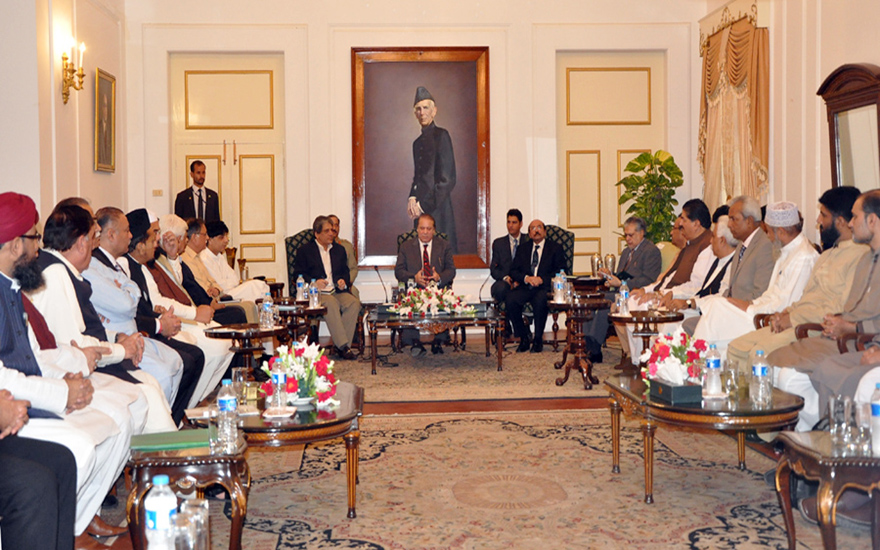
At the end of his trip, the Prime Minister ordered the Rangers to carry out a multi-pronged operation in Karachi, with the backing of the Sindh government. The only party that appeared to be unhappy and critical of the move was the MQM, which had demanded that the army be asked to conduct the operation.
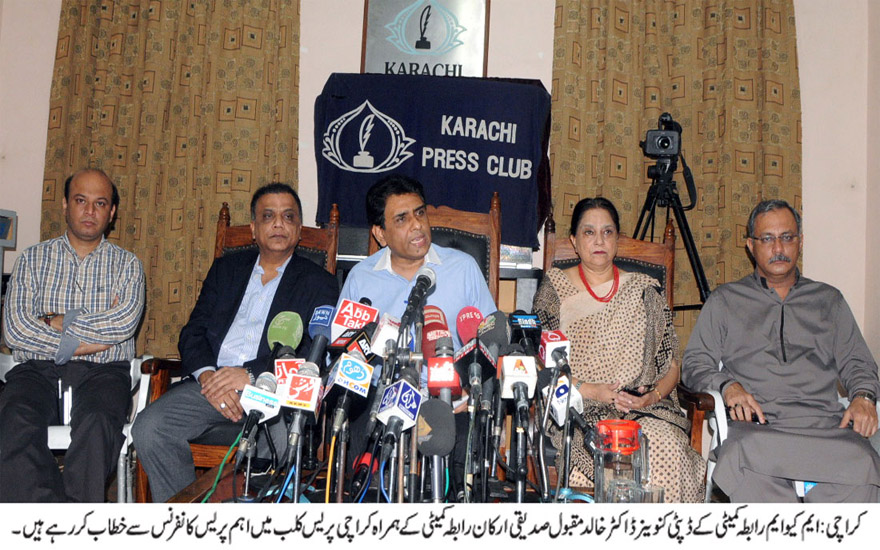
In the second phase, which may start by the third week of October, speedy trial courts will be set up which will announce their verdicts in 90 days. Rangers have already been given powers of interrogation and investigation in five special police stations in the five districts of Karachi. Major amendments are being made in the Anti-Terrorism Act, whereby video link facilities will be provided to protect the witnesses. The Sindh Assembly would become the first assembly in Pakistan to pass a Witness Protection Bill. The government is also considering amending the law to accept a statement made before the police as admissable in a court of law.
The Sindh government took a major initiative by introducing the Sindh Arms Act, 2013, under which no person can hold more than four arms license. However, the government had no answer when the Supreme Court asked, “Why four? It is like four marriages.”
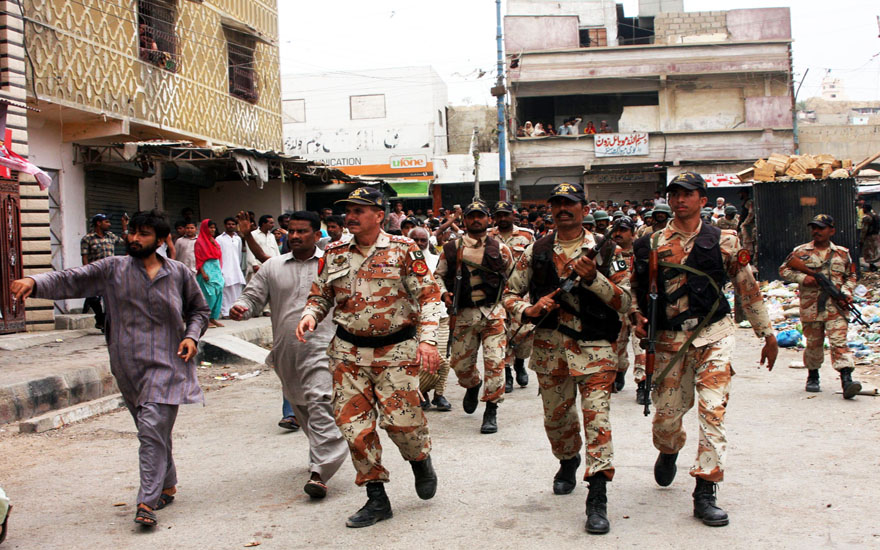
Now the government has given a deadline for all licence-holders to surrender their weapons and licenses within two weeks. Additionally, a ban has been imposed on issuance of any fresh license. After the expiry date, a strategy would be evolved for the recovery of weapons. A ban has also been imposed on the display of weapons, a normal practice in Karachi, particularly with the guards of VIPs and VVIPs.
The maximum punishment for holding an illegal weapon has been increased to 14 years imprisonment, but punishing the violators will prove to be a test of the government’s will. A former Chief Justice of the Sindh High Court, Justice Musheer Alam recently observed that the implementation of capital punishment could also help in reducing crime, as even jails have become a haven for some criminals. They have access to all the comforts of life, including drugs, mobiles and laptops.
Another significant step, which will be taken from October 1 onwards, is the complete checking of all kinds of vehicles for proper registration, payment of vehicle tax, legal number plates etc. However, due to the massive corruption which exists among the police and the Excise and Taxation Department, there is a slim chance of any major successes. For instance, about 90 per cent of the unfit buses, mini buses, taxis and rickshaws were issued fitness certificates after bus and cab drivers paid Rs 1,000 to Rs 2,000 per certificate.
The third and the most crucial phase would be a full-fledged operation for the recovery of legal and illegal arms in which the government may have to seek the help of the army. The Supreme Court has already hinted that it could impose curfew to recover the weapons. However, it is very important that the law enforcement agencies have reliable intelligence on this score. Also, this phase can only yield the desired results if it is launched “unannounced.” Already there are reports that hundreds and thousands of weapons have been shifted either to Waziristan or Balochistan, and some intelligence officials do not rule out the possibility that they could also be dumped in the city.
Unfortunately, Karachi is not only a commercial hub, but also a hub for national and international terrorist gangs. Top Al-Qaeda militants, who were involved in major terrorist attacks around the world like the Bali bombings, were arrested from here. It has also become an economic hub for these groups as they collect several billion rupees evey month as extortion money. Additionally, the city also provides them a “safe exit” to go abroad through its port and airport.
Keeping all this in mind, the major concern for the Sharif government is not just the ongoing operation, but how to sustain it.
The bench headed by the Chief Justice of Pakistan, Justice Iftikhar Mohammad Chaudhry, while hearing the case on Karachi’s law and order situation, rightly observed that the recently launched operation by the police and para-military Rangers may have started well, but there is a big question mark about its “sustainability” against the might of the criminals and terrorists. The concern was visible on the faces of Justice Chaudhry and the four other judges in the jam-packed court room in Karachi.
The court has passed a 47-page order, its second in two years, on the deteriorating law and order situation in Karachi, where on average around 5,000 to 6,000 people are killed every year. But the case has not ended, as the Chief Justice stated in the presence of the DG, Rangers, the IGP, Sindh, the Chief Secretary and others, “We will come back again in two weeks to see the progress of the operation and the implementation of our orders.”
Two years back, on August 26, 2011, the Supreme Court passed an order on Karachi’s law and order situation, where it was also pointed out that militant wings of political parties did, indeed, exist. Since then, the bench is hearing the case on the non-implementation of its order and monitoring its progress.
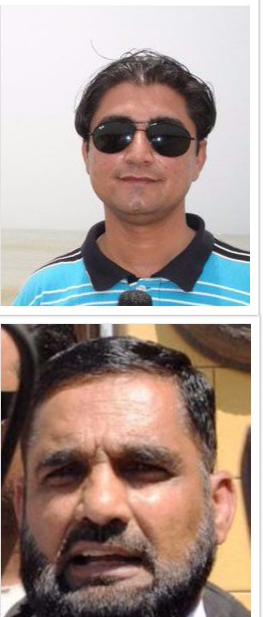 The apex court was also stunned to hear the startling disclosure that in Karachi alone, some 37, 000 criminals and over 150 terrorists are absconders, and around 150 people were released on parole and never returned.
The apex court was also stunned to hear the startling disclosure that in Karachi alone, some 37, 000 criminals and over 150 terrorists are absconders, and around 150 people were released on parole and never returned.
“How can one expect peace in a city when so many criminals and terrorist are roaming around freely,” he observed.
Perhaps as a result of pressure from the SC, after several years the cases of the mysterious murders of 170 police officials said to be involved in the 1992 and 1994-96 operations, were re-opened. However, one doubts if it will lead to the arrests and trials of the suspects.
The trial of journalist Wali Khan Babar, who was killed two years back, may also conclude in October — the first of any Pakistani journalist’s murder. The only other case of a journalist’s murder in which the court gave a verdict was that of US reporter Daniel Pearl, who was killed in Karachi in 2002. Babar’s case is a challenging one since many of the witnesses have been killed. However, it seems the police has started to take swifter action against such killings. A leader of PML-N’s Sindh lawyer’s wing and public prosecutor, Naimat Ali Randhawa, was killed on September 26 soon after he took on Babar’s case. But less than a week later, the police announced the arrest of Kazim Abbas Rizvi, who is associated with the MQM, on charges of being involved in Randhawa’s death. The MQM has, expectedly, denied any involvement in the murder and claim the arrest is part of a conspiracy to malign the party. The Karachi police chief Shahid Hayat though has stated in a press conference that the targeted operations in the city aim to rid Karachi of criminals, irrespective of which party they may belong to.
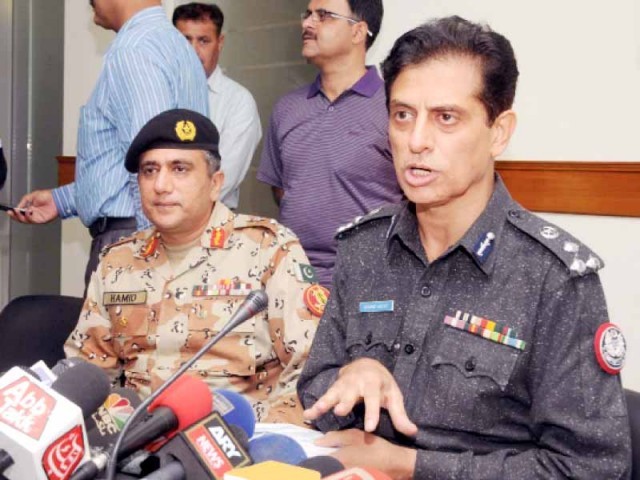 A leader of PML-N’s Sindh lawyer’s wing, Naimat Ali Randhawa, was killed soon after he took on Wali Babar’s case. Less than a week later, the police announced the arrest of Kazim Abbas Rizvi, who is associated with the MQM. The MQM has, expectedly, denied any involvement with the murder and claim the arrest is part of a conspiracy to malign the party. The Karachi police chief Shahid Hayat though has stated that the targeted operations in the city aim to rid Karachi of criminals, irrespective of which party they may belong to.
A leader of PML-N’s Sindh lawyer’s wing, Naimat Ali Randhawa, was killed soon after he took on Wali Babar’s case. Less than a week later, the police announced the arrest of Kazim Abbas Rizvi, who is associated with the MQM. The MQM has, expectedly, denied any involvement with the murder and claim the arrest is part of a conspiracy to malign the party. The Karachi police chief Shahid Hayat though has stated that the targeted operations in the city aim to rid Karachi of criminals, irrespective of which party they may belong to.
Karachi has become ungovernable — and has been so far several years now. But mere deweaponisation of the city may not be a solution. If Karachi is recognised as a “mini Pakistan,” it should also be treated as one. Its resources should be spent on its population.
Karachi needs a local policing system, free of political interference, a speedy justice system, a metropolitan transport system, a circular railway and, above all, revival of the Karachi Mass Rapid Transit System that has been pending for the past 40 years.
Additionally, people need outlets like playgrounds, cinemas and more cultural activities.
It is heartening that Prime Minister Nawaz Sharif realises that all economic development is intrinsically linked to the
elimination of terrorism. The will is there, but will he find a way to do it, without fear or favour?


